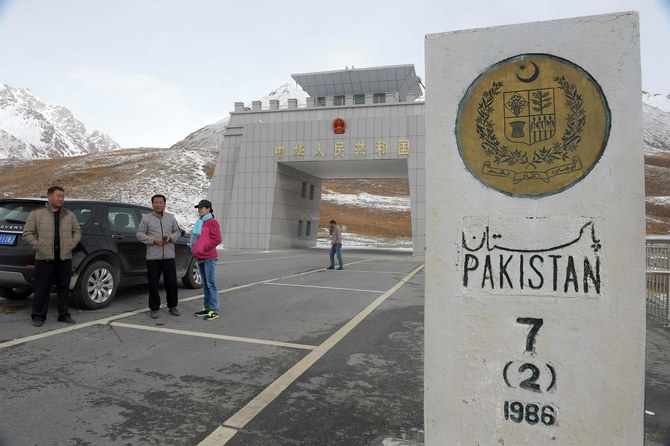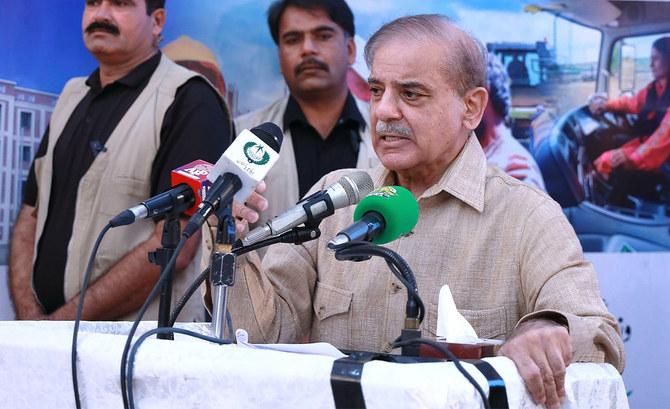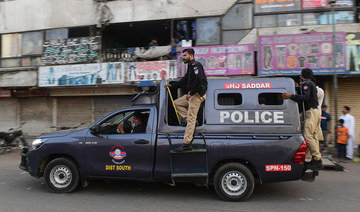ISLAMABAD: Their Uighur wives vanished in 2017, swept up in a Chinese dragnet tackling Islamic extremism, now they’ve been released — but the Pakistani husbands left behind say freedom has come at a price: The women must prove their “adaptability to Chinese society,” and publicly sacrifice their religious ideals.
The group of around 40 women — all from the western Chinese province of Xinjiang and married to traders from neighboring Pakistan — were among some one million people believed to be held in a network of internment camps that authorities downplay as “vocational education centers.”
But the men say their partners were forced into acts that are haram, or forbidden, to followers of Islam — both in the camps and now they’ve been freed.
“She said they had to eat pork and drink alcohol, something she still has to do,” one merchant, who recently visited his wife at her parents’ house in Xinjiang told AFP, on condition of anonymity.
“She was told that she had to satisfy the authorities that she no longer possesses radical thoughts if she does not want to go back,” he explained, adding that she had given up praying and the Qur’an had been replaced by books on China at his in-laws home.
Some of the traders, who traditionally leave their wives in Xinjiang for weeks or months at a time when they return home to conduct business, believe the women were taken to the camps because of their connection to Pakistan, which is an Islamic republic.
Former detainees have said they were held simply for following Islamic traditions, such as having a long beard or wearing a veil.
But with the detention centers, part of a security clampdown targeting Muslims including ethnic Uighurs, facing growing international condemnation and China pushing its economic relationship with Pakistan, authorities began slowly releasing the women two months ago.
Faiz Ullah Faraq, a spokesman for the government of Gilgit-Baltistan, the Pakistani region which borders Xinjiang, confirmed the “majority” have now been released.
AFP interviewed nine of the women’s husbands, who confirm their wives are free but cannot leave Xinjiang for three months, during which time they will be closely monitored.
“They will observe her adaptability to Chinese society and if they deem her to be unfit she will be sent back,” a gemstone trader said of the rules of release.
Their initial joy at the release of much-loved wives and mothers has faded because the women who’ve returned are like strangers.
“My wife said she was forced to dance, wear revealing clothes, eat pork and drink alcohol in the camp,” he revealed, adding that she now carries with her a book of guidelines, which features illustrations such as a mosque marked with a red cross, and a Chinese flag with a green tick.
“She used to pray regularly but now it’s gone, and she has started occasionally drinking (alcohol) which she does in the restaurants,” he explained, adding that he believed officials required such acts from the women.
He too declined to give his name for fear of repercussions from authorities, who make surprise visits to his wife’s home in Xinjiang every week.
James Leibold, an expert on Chinese security at Australia’s La Trobe University, told AFP that stepped-up surveillance policies in Xinjiang gave authorities “increased confidence” in their ability to closely monitor those released from the camps.
Since their release, the families of many of the women say they have become paranoid and fear of being reported on.
“The worst thing was her silence,” the merchant explained, adding: “She suspects everyone, her parents, her family, even me.”
The seven other traders interviewed by AFP, anonymously, have been in contact with their wives only by telephone and gave similar testimonies.
The Chinese foreign ministry in Beijing declined to comment on the releases, and a Pakistani foreign ministry spokesman did not respond to requests.
In an interview with Pakistani TV channel HUM news, Lijian Zhao, deputy head of mission at the Chinese Embassy branded claims the government is forcing Muslims to eat pork and drink alcohol in Xinjiang as “propaganda from the west.”
He said: “They are trying...to create differences between China and Pakistan and other Muslim countries.”
Maya Wang, Human Rights Watch’s senior researcher on China, said the activist group has heard stories of people being released from the camps and subjected to house arrests or severe restrictions on movement.
“These releases may indicate that the Chinese government is increasingly sensitive to heightening international pressure over its serious abuses in Xinjiang,” she said.
Last month US Secretary of State Mike Pompeo renewed demands China end its widespread detention of Uighur Muslims as he met with Mihrigul Tursun, who claims to be a former detainee, and has spoken publicly about what she said was widespread torture in the camps.
Beijing “cannot afford international criticism of its policies in Xinjiang to spread throughout the Muslim world, especially in Pakistan,” China security expert Leibold explained.
In recent years, China has strongly pushed its relationship with Pakistan, investing heavily in infrastructure projects under the China-Pakistan Economic Corridor.
For its part, Pakistan has been reluctant to publicly join global condemnation of Beijing’s crackdown on Muslims in Xinjiang. When pressed on the subject in a recent interview with the Financial Times, Prime Minister Imran Khan said: “Frankly, I don’t know much about that.”
But for the merchant and the other traders, it is as though their wives are still lost.
He explained: “My wife, a practicing Muslim, has been turned into someone I could not even imagine. She has given up her prayers, drinks and eats pork,“
He added: “I am afraid our marriage will not last long because she is a completely different person, someone whom I don’t know.”
China frees ‘lost’ Uighur wives but at a price, families say
China frees ‘lost’ Uighur wives but at a price, families say

- "Majority" have now been released, confirmed spokesman for Pakistan's Gilgit-Baltistan government
- Former detainees say they were held simply for following Islamic traditions
Saudi crown prince sincerely wants Pakistan to progress— PM Sharif

- PM Sharif says Saudi business delegation’s upcoming visit to Pakistan will enhance its economic ties with Kingdom
- Sharif returned from Riyadh this week after holding extensive discussions on trade, investment with Saudi officials
ISLAMABAD: Saudi Crown Prince Mohammed bin Salman sincerely wants Pakistan to progress and prosper, Prime Minister Shehbaz Shari said on Wednesday after returning from a trip to the Kingdom earlier this week.
Sharif was in Riyadh from Apr. 27-30 to attend a special two-day meeting of the World Economic Forum on global collaboration, growth and energy. The Pakistani prime minister met the Saudi crown prince and the Kingdom’s various ministers to discuss bilateral investment and economic partnership during his stay.
Sharif spoke about his recent visit to the Kingdom during a luncheon he hosted at his Lahore residence for laborers and their families on the occasion of Labor Day.
“I have just returned from Saudi Arabia and believe me, my honorable brother there, Crown Prince Mohammed bin Salman, with all his heart, wants Pakistan to progress and wants to see prosperity in Pakistan,” Sharif said to loud applause.
The Pakistani prime minister said he held extensive meetings with Saudi ministers and their teams in Riyadh on the sidelines of the WEF meeting, describing them as “extremely satisfactory.”
“In a few days, [a delegation of] Saudi businesspersons will come to Pakistan and that will enhance our trade relations,” he said.
In February 2019, Pakistan and Saudi Arabia inked investment deals totaling $21 billion during the visit of the Saudi crown prince to Islamabad. The agreements included about $10 billion for an Aramco oil refinery and $1 billion for a petrochemical complex at the strategic Gwadar Port in Balochistan.
Saudi Foreign Minister Prince Faisal bin Farhan visited Pakistan last month with a high-level delegation to strengthen bilateral economic cooperation and push forward previously agreed investment deals with the South Asian country.
Pakistan has said it pitched investment projects worth $30 billion to Riyadh during Prince Faisal’s visit.
Pakistan and Saudi Arabia enjoy strong trade, defense and cultural ties. The Kingdom is home to over 2.7 million Pakistani expatriates and serves as the top source of remittances to the cash-strapped South Asian country.
Both Pakistan and Saudi Arabia have been closely working to increase bilateral trade and investment deals, and the Kingdom recently reaffirmed its commitment to expedite an investment package worth $5 billion.
Cash-strapped Pakistan desperately needs to shore up its foreign reserves and signal to the International Monetary Fund (IMF) that it can continue to meet requirements for foreign financing which has been a key demand in previous bailout packages.
Saudi Arabia has often come to Pakistan’s aid in the past, regularly providing it oil on deferred payments and offering direct financial support to help stabilize its economy and shore up its forex reserves.
President Zardari directs Sindh to launch ‘large-scale operation’ against criminals in Karachi

- President Zardari chairs high-level meeting attended by interior minister, provincial ministers in Karachi
- Zardari asks chief ministers to provide security to foreign nationals in Sindh, curb street crimes in Karachi
KARACHI: President Asif Ali Zardari on Wednesday directed Sindh Chief Minister Syed Murad Ali Shah to launch a “large-scale operation” against criminals in Karachi and Sindh, amid a surge in street crimes and incidences of kidnapping in Pakistan’s southern province.
The president issued these directions while he chaired a meeting on the deteriorating law-and-order situation in Sindh. The meeting was also attended by Interior Minister Mohsin Naqvi and Minister of Science and Technology Khalid Maqbool Siddiqui. Provincial ministers Sharjeel Inam Memon, Nasir Shah and Ziaul Hasan Linjar, Inspector General Police Sindh Ghulam Nabi Memon and others also participated in the huddle.
Karachi, a metropolis of 20 million that hosts the stock exchange and central bank, has for decades been beset by armed violence. While an armed campaign by the military, with help from police, paramilitary Rangers and intelligence agencies, against armed gangs and suspected militants in the city brought down murder rates after 2013, street crimes have been on the rise again since last year, with shooting deaths in muggings and robberies once again becoming a daily headline.
Street crimes saw an increase during the first four months of 2024, particularly during the Islamic holy month of Ramadan, driving fear into the hearts of the city’s citizens.
“President of Pakistan Asif Ali Zardari presiding over a special law & order meeting at CM House directed the Sindh Chief Minister Syed Murad Ali Shah to launch a large-scale operation against street criminals in Karachi,” the Chief Minister’s House said.

It added that the president ordered strict action be taken against dacoits in Sindh and drug traffickers throughout the province in close coordination with other provinces.
Zardari urged the chief minister to provide a posting tenure to police officers, monitor their performance, and remove them when they fail to deliver, the statement added. The president asked Shah to ensure foreign nationals living and working in Sindh were guaranteed security.
“He emphasized the need to particularly look after the Chinese nationals working on CPEC-related projects,” the CM House said.
Memon briefed the president that in total 5,357 crimes were reported in Sindh during the first four months of the year, corresponding with 5,259 incidents in the corresponding period last year.
Zardari was told that in January, 252.32 street crime cases were reported in Karachi while in February the number decreased to 251.96.
“The trend of street crime decreased in March and April when 243.35 and 166.2 cases were reported respectively,” the statement said.
The Sindh IG disclosed that 49 people were killed in 48 street crimes in Karachi this year, adding that in these cases 43 accused have been arrested while 13 were killed in encounters.
President Zardari directed the chief minister to control street crimes in the province by launching a result-oriented special operation.
“The operation must deliver results so that confidence of the citizens could be developed,” Zardari was quoted as saying by the CM House.
President Zardari lamented that stolen/snatched vehicles and mobile phones were sold in the city’s market in parts, adding that this was known to police and others.
“Why the police were not taking operations against the markets and people involved in the business of stolen/snatched vehicles and mobile sets,” he asked.
The president directed Shah to ensure the Karachi Safe City Project, an initiative to install surveillance cameras in key parts of the city to monitor crime, was completed on a “war footing.”
Pakistan’s Babar Azam closes in on India’s Yadav for top T20I batter spot

- Babar Azam climbs one place to secure number four spot on T20I Batter Rankings
- Azam scored 125 runs from four innings in recent home series against New Zealand
ISLAMABAD: Pakistan captain Babar Azam has improved one spot on the ICC Men’s T20I Batter Rankings, closing in on India’s top-ranked batter Suryakumar Yadav, the International Cricket Council (ICC) said on Wednesday.
Azam was Pakistan’s leading run-scorer during the recently concluded home series against New Zealand. The right-handed batter scored a half-century to lead his team to victory in the fifth and final T20I of the series. He scored 125 runs from four innings at the top of his side’s batting order.
“Good signs for the Pakistan captain just weeks out from the start of the ICC Men’s T20 World Cup as he closes in on the No.1 T20I batter ranking,” a post by the ICC on its website read.
Azam’s performance helped him improve one spot to number four on the updated list of T20I rankings for batters. It boosted his rating by a total of 10 points, helping him reach 763 points with Yadav now just 98 rating points ahead of the Pakistan skipper.
Azam is one number behind teammate Muhammad Rizwan, who occupies the number three spot in the rankings with 784 points behind England’s Phil Salt, who has 802 points.
Pakistani pacer Shaheen Shah Afridi also jumped three places to equal 14th spot following his eight wickets across four matches against the Kiwis.
Pakistan will next head to Ireland and England to play three T20Is against the former from May 10-14 and four T20Is against the latter from May 22-30.
The 2009 World Cup champions will then head to the USA and West Indies to take part in the ICC Men’s T20 World Cup 2024 scheduled to be held in June.
Barrick Gold in talks with IFC, other agencies to raise $2 billion for Pakistan’s Reko Diq

- Reko Diq in southwestern Pakistan is one of world’s biggest under-developed copper mines
- Barrick Gold CEO says mining company needs $2 billion for first phase of Reko Diq project
TORONTO: Barrick Gold is not interested in bidding for Anglo American, which last week received a $39 billion takeover offer from BHP, and is building its own copper portfolio, the Canadian miner’s CEO Mark Bristow said on Wednesday.
If BHP’s proposed acquisition of Anglo is successful, it would create one of the world’s biggest copper miners.
Analysts and investors expect rival bids to emerge after BHP’s offer was rejected last week by Anglo, which said it was opportunistic, significantly undervaluing the company and its future prospects.
“We are not interested in bidding for Anglo American, as we are building (copper assets) of our own,” Bristow told Reuters.
Bristow is betting on developing the Reko Diq copper project in Pakistan in which it holds a 50 percent stake, the first phase of which is expected to cost $5.5 billion.
Barrick is in talks with the International Finance Corporation and other agencies to raise at least $2 billion for the first phase of the project, Bristow added.
Reko Diq, one of the biggest yet-to-be-developed copper mines in the world, is also 50 percent owned by the government of Pakistan. Saudi Arabia is in talks to buy part of the stake from the Pakistan government.
In Mali, where Barrick has a gold mine, the military-led government was last year in talks with miners over a change to its mining law that could see it boost state and private Malian interests in new projects to 35 percent from up to 20 percent previously.
However, Bristow said that the company has received written assurances from the junta that there was no threat of its assets being nationalized.
Pakistan strongly condemns ‘heinous’ Afghanistan mosque attack that killed six

- Gunman stormed mosque in Afghanistan’s Herat province on Monday, killing six and injuring one
- Pakistan says it condemns “terrorism” in all its forms, including attacks on places of worship
Islamabad: Pakistan’s foreign office on Wednesday strongly condemned a “heinous terrorist attack” that left six people dead in Afghanistan’s Herat province this week, reiterating Islamabad’s stance that it condemns violence in all its forms.
A gunman stormed a mosque in Herat province’s Guzara district on Monday, killing six worshippers and injuring one. Locals said the attackers had targeted the minority Shia community in the country.
Militant group Daesh claimed responsibility for the attack in a post on social media platform Telegram. Its regional chapter is the largest security threat in Afghanistan and has frequently targeted Shia Muslims.
“Pakistan condemns in the strongest terms yesterday’s heinous terrorist attack at a mosque in Herat, Afghanistan, resulting in loss of life and injuries,” the Ministry of Foreign Affairs (MoFA) said in a press release.
The foreign office said the people and government of Pakistan stand with the people of Afghanistan and express their heartfelt condolences over the loss of lives in the incident.
“Pakistan condemns terrorism in all its forms and manifestations, including despicable attacks on places of worship,” it added.
Relations between Afghanistan and Pakistan have deteriorated after militant attacks in Pakistan’s Khyber Pakhtunkhwa and Balochistan provinces bordering Afghanistan surged. The attacks increased after a fragile truce between Islamabad and the Tehreek-e-Taliban Pakistan (TTP), a banned outfit that pledges allegiance to the Afghan Taliban but is a separate group from it, broke down in Nov. 2022.
Islamabad says the attacks are launched mostly by TTP members who operate from safe havens in Afghanistan. Kabul denies this and blames Islamabad for not being able to handle its security challenges.
Tensions escalated in March when Pakistan conducted two airstrikes in Afghanistan against what it said were militant targets. Afghan officials said the airstrikes killed eight civilians, including five women and three children.













